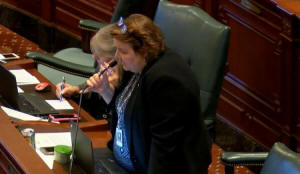Lawmakers could take up measure impacting various professions when they
return next week
 Send a link to a friend
Send a link to a friend
 [April 08, 2021]
By Greg Bishop [April 08, 2021]
By Greg Bishop
(The Center Square) – Illinois state
lawmakers could soon give a private association sole authority over
certifying stage riggers who want to work in Illinois.
That’s just one of several labor-focused measures advancing at the
statehouse.
The city of Chicago already requires those rigging light and sound
equipment to be certified by the Entertainment Technician Certification
Association.
During a hearing last month in the Illinois House Labor and Commerce
Committee about House Bill 419 to require it statewide, state Rep.
Kathleen Willis, D-Addison, had concerns the proposal gives only one
group the authority over such certification.

“While I totally support 110% having certified and the best trainers, I
hate putting in legislation that puts only one pathway on it,” Willis
said.
Despite those concerns, the measure passed the committee unanimously. If
passed and approved by the governor, the measure would require 3,000
hours of rigging experience and a passage of test administered by the
ETCA before being certified.
Separately, another measure that passed the committee unanimously, House
Bill 836, would permit virtual training for professional security
officers and private detectives, among other things, according to
security professional David Peck.
“Also, adding an eight-hour annual training requirement that must
consist of range practice with live ammunition and minimum accuracy,”
Peck said.
[to top of second column]
|

State Rep. Kathleen Willis,
D-Addison, speaks on the Illinois House floor on October 25,
2017.
Image courtesy of BlueRoomStream

The House could take up these and other measures when they return
next week.
In the Senate, a group of certified nurse anesthetists wants a
change in state law it said will allow for better quality surgical
care in rural Illinois.
Senate Bill 2566 could come up in a Senate Committee this month.
Matt Bednarchik with the Illinois Association of Nurse Anesthetists
said the measure would drop a “physical presence requirement.”
“Hospitals will not have to, they won’t interpret it as thinking
that they have to have a special type of provider, specifically a
physician anesthesiologist there to physically supervise,”
Bednarchik told WMAY.
He said CRNAs carry liability insurance and are responsible for
their actions. If the measure is approved, Bednarchik said it could
help give rural hospitals more flexibility to offer more services.
“An example of this would be increased care options for things like
substance abuse disorders, we’re currently in an opiod crisis,
mental health disorders, cancer care and an increase in surgical
services,” Bennarchik said.
Messages seeking comment from the Illinois Society of
Anesthesiologists were not returned.
The Senate returns next week.
 |